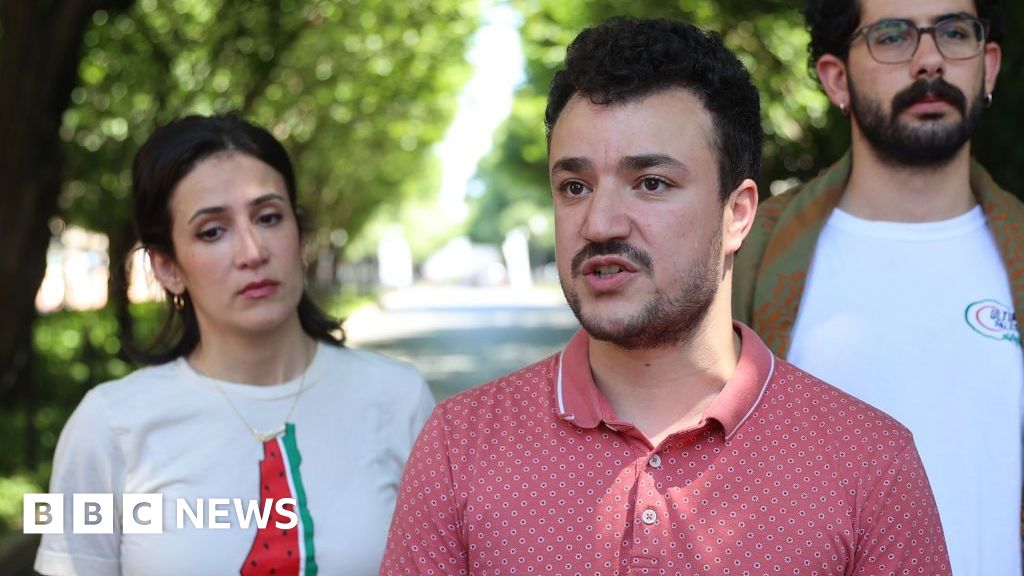ARTICLE AD BOX
Watch: Four dramatic moments from Alex Murdaugh trial
By Holly Honderich
BBC News
Jury deliberations have just begun in the trial of disgraced lawyer Alex Murdaugh, accused of fatally shooting his wife and son.
The prosecution has argued Mr Murdaugh killed his wife, Maggie, and son, Paul, in attempt to conceal years of financial crimes, crimes he himself admitted to in court.
Mr Murdaugh has pleaded not guilty, forcefully insisting he would "never" harm his family.
And for six weeks, as both sides have tried to make their case, jurors have heard from dozens of witnesses, some providing new evidence, others offering emotional testimony.
How the 12 jurors weigh that evidence will be especially critical here, because the prosecution's case against Mr Murdaugh is based entirely on circumstantial evidence.
No direct evidence - things like a murder weapon, blood on Mr Murdaugh's clothing or an eyewitness - was introduced.
As the jurors deliberate on Mr Murdaugh's fate, here is some of the evidence that's likely to be on their minds.
A Snapchat video exposes a lie
On 7 June 2021, Maggie and Paul were killed at the dog kennels on the family's sprawling hunting estate, called Moselle.
And for 20 months after their murders, Alex Murdaugh told law enforcement repeatedly he had not been at the dog kennels at all that evening, but had been at home napping.
But a Snapchat video filmed by Paul just minutes before prosecutors say the shootings took place features Mr Murdaugh's voice in the background.
And on the stand at trial, Mr Murdaugh admitted he lied, saying his years-long addiction to painkillers had put him in a paranoid state.
Prosecutors have used the instance to argue Mr Murdaugh was an experienced and deft liar. "Don't let him fool you, too," he said.
Alibi or strategy?
Mobile phone and GPS data from the night of the murders featured heavily in court.
In the early evening hours on 7 June, Mr Murdaugh's phone seemed to be sitting still at his family's home.
But beginning at 21:02 local time - minutes after experts say the murders occurred - his phone shows a burst of activity, including 283 steps taken in four minutes.
Image source, Andrew J. Whitaker/The Post and Courier/Pool
Image caption,Bullet holes were seen in the glass at the Murdaugh Moselle property during a visit by jurors
Mr Murdaugh also placed several calls to family and friends - including to his wife - and drove to visit his mother, who lived about 15 minutes away.
The defence argued in court this was standard operating procedure for the Murdaugh family, who regularly exchanged texts and calls.
But prosecutors argued these activities showed the efforts of a veteran lawyer to manufacture an alibi.
Years of theft
Early on in the proceedings, Judge Clifton Newman ruled that prosecutors could bring in evidence of Mr Murdaugh's alleged financial misdeeds.
Investigators say Mr Murdaugh stole millions from clients and colleagues, including $3.7m (£3m) in 2019 alone. And at trial, Mr Murdaugh admitted to wide-scale theft.
Image source, Andrew J. Whitaker/The Post and Courier/Pool
Image caption,An evidential photograph of a phone found in undergrowth was shown to the jury
Prosecutors say this crime was what drove Mr Murdaugh to murder - that he thought the deaths of Maggie and Paul would stop his financial crimes from being exposed.
Mr Murdaugh and his defence team argued in court that this theory was ludicrous and that financial problems would never have led him to murder.
As Judge Newman told the court on Thursday, Mr Murdaugh has the presumption of innocence until the jury decides otherwise.
"It is a substantial right to which every defendant is entitled unless you the jury are satisfied from the evidence of the guilt of the defendant beyond a reasonable doubt," he said.

 2 years ago
37
2 years ago
37








 English (US) ·
English (US) ·